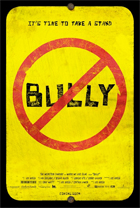Bully
|  At this point, Lee Hirsch’s Bully is probably better known to the general public as distributor Harvey Weinstein’s latest means of garnering free publicity by manufacturing a fight against the MPAA than it is as a crusading documentary about the potentially lethal ramifications of chronic bullying. Shot during the 2009–2010 school year, it follows the stories of five families whose children have been the victims of bullying in order to put specific human faces on a problem that all too easily slides into the abstract or is dismissed as just another perennial hurdle to leap during childhood. The film has its powerful moments and its heart is certainly in the right place, but as a whole it feels too narrow in its focus, sacrificing the larger context for a sense of intimacy whose state-the-obvious dividends run out fairly early. At this point, Lee Hirsch’s Bully is probably better known to the general public as distributor Harvey Weinstein’s latest means of garnering free publicity by manufacturing a fight against the MPAA than it is as a crusading documentary about the potentially lethal ramifications of chronic bullying. Shot during the 2009–2010 school year, it follows the stories of five families whose children have been the victims of bullying in order to put specific human faces on a problem that all too easily slides into the abstract or is dismissed as just another perennial hurdle to leap during childhood. The film has its powerful moments and its heart is certainly in the right place, but as a whole it feels too narrow in its focus, sacrificing the larger context for a sense of intimacy whose state-the-obvious dividends run out fairly early.As most already know, Bully has been the center of attention in a protracted dispute between the MPAA ratings board on the one hand, which for a long time insisted that the film’s language was enough to garner an age-restrictive R rating, and Hirsch and Weinstein on the other hand, who feel that the film, due to its good intentions and potentially important role in the national discussion about bullying, should be granted a nonrestrictive PG-13 rating. There is something ridiculous in the fact that the MPAA wanted to restrict the film from the very age group the film depicts, but at the same time, there is something sanctimonious about the Hirsch/Weinstein position and, given Weinstein’s history with using controversy over the ratings system to sell movies (which he did very successfully with Miramax in the late 1980s and early ’90s), disingenuous. Part of the Hirsch/Weinstein argument is that kids need to see Bully, but I’m not entirely sure that’s the case. Kids live in the world depicted in Bully, and there is little in the film that they would find revelatory outside of bullies themselves getting to see the effects of their actions. Of course, one thing the film fails to do is present bullying as anything other than a simplistically cruel behavior; that is, there is no attempt to explain where bullying comes from and what needs it fulfills for those doing the bullying. Rather, Bully is told entirely from the victims’ perspective, which unfortunately minimizes the fact that many bullies are themselves the victims of other bullies (often abusive adults) or are weak-willed followers who go along with the group for fear of being singled out. For what it does, though, Bully is often quite effective. The stories it tells are frequently heart-breaking and just as often infuriating. Hirsch and producer/co-writer Cynthia Lowen embedded themselves in several schools in four different states (all of which turn out to be in the South and Midwest, which further limits the film’s focus) and followed several kids over the course of the school year. The most memorable is Alex Libby, a 12-year-old who was born several months premature and now endures an unending stream of physical and verbal abuse from his fellow classmates because he “looks funny.” Sixteen-year-old Kelby has been victimized ever since she came out as a lesbian, while 14-year-old Ja’Meya, an honor-roll student, was sent to juvenile prison after she cracked under the strain of her torment and brought a loaded gun onto the school bus. Even more disheartening are the stories of 17-year-old Tyler Long and 11-year-old Kirk Smalley, who cannot appear in the film because they each committed suicide, leaving only their distraught parents to explain what was happening to them. While Hirsch and Lowen capture instances of bullying on video, including both verbal and physical abuse aimed at Alex on the school bus, the film’s most infuriating footage involves the school officials, who seem either purposefully avoidant or downright clueless as to what is going on. In one sequence, Kim Lockwood, assistant principal at Alex’s middle school, chastises a victim for not shaking the hand of a bully, who is all too willing to play nice in front of authority. It is a moment of powerful revelation, where we see in a single shot the underlying problem writ large: Bullies get away with their actions because they have learned how to work the system, which in turn is all too willing to take the path of least resistance in addressing the problem. Ultimately, the whole ratings fracas over Bully is a red herring because it’s not 12-year-olds who need to see it, but rather their school administrators. Copyright ©2012 James Kendrick Thoughts? E-mail James Kendrick All images copyright © The Weinstein Company |
Overall Rating: 

 (2.5)
(2.5)


